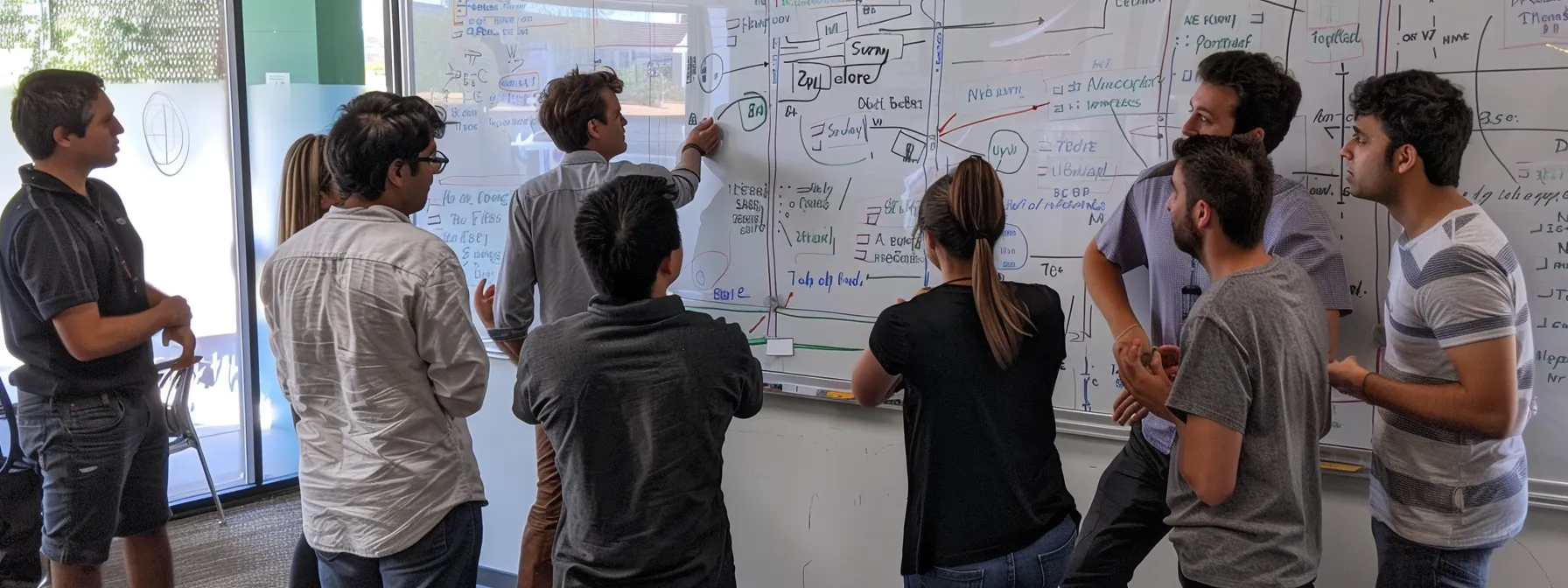Disclaimer: We sometimes use affiliate links in our content. For more information, visit our Disclaimer Page.
Are you struggling to lead your project teams effectively? Many project managers face challenges in ensuring their teams deliver high-quality results. This article will explore key strategies for success, such as establishing clear goals, fostering open communication, and empowering team members through delegation. By implementing these strategies, you can gain better visibility into your projects, enhance your team’s soft skills, and improve overall performance. Read on to discover practical tips that can help you overcome common project management obstacles and drive your team’s success.
Establishing Clear Goals and Expectations

Setting SMART objectives is crucial for aligning your team’s efforts and improving efficiency. Clarifying roles and responsibilities helps establish behavior expectations, ensuring everyone knows their contributions. Effective communication of these expectations is key for your team’s success and the chief information officer’s vision. Together, these strategies enhance resource management and drive project success.
Setting SMART Objectives for Team Alignment
When you set SMART objectives, you create a framework that supports team alignment and boosts collaboration. Specific, Measurable, Achievable, Relevant, and Time-bound goals provide clarity, allowing team members to take ownership of their tasks. For instance, a project management professional might use analytics to track progress, ensuring that all stakeholders stay informed and can adjust strategies as needed.
Implementing SMART objectives also minimizes misunderstandings and promotes accountability within the team. By establishing clear expectations, you empower your team to adopt a proactive approach, leading to greater engagement and productivity. Consider a situation where a team is tasked with a data analysis project: having well-defined goals helps them prioritize tasks effectively and allocate resources efficiently, driving the project toward successful completion.
Clarifying Roles and Responsibilities
Clarifying roles and responsibilities is fundamental to achieving project success. When each team member understands their specific tasks, it allows for effective resource management and enhances overall efficiency. For instance, a project manager facilitating quality assurance can create an enabling environment where everyone feels valued, inviting authentic leadership that inspires and motivates the team to perform at their best.
Incorporating clear role definitions helps in evaluating individual contributions and identifies areas for improvement. When your team operates like an engine where each part functions seamlessly, it becomes easier to foster collaboration. Implementing structured evaluations ensures that all members gauge their performance against established objectives, driving accountability and aligning efforts toward common goals.
Communicating Expectations Effectively
Effective communication of expectations is vital for fostering discipline within your team. When you clearly articulate what is required, you set the standard for productivity and customer satisfaction. For example, as an expert in project management, you can conduct regular check-ins to ensure that everyone understands their responsibilities and has the tools necessary to succeed. This practice not only keeps the team aligned but also builds a culture of accountability.
Utilizing automation tools can significantly enhance how you communicate expectations. By streamlining updates and feedback processes, you free up time to focus on more strategic discussions with your team. This proactive approach allows you to address any challenges before they escalate, ultimately driving performance and ensuring everyone remains on track to meet project objectives.
Once you have clear goals, the next step is to build a strong line of communication. Open dialogue and teamwork will deepen understanding and drive success.
Fostering Open Communication and Collaboration

To lead high-performing teams effectively, you must foster open communication and collaboration. Encouraging feedback and practicing active listening builds trust and enhances stakeholder management. Implementing collaborative tools and technologies streamlines data analysis and improves efficiency. Regular team meetings allow you to address communication barriers while boosting team confidence and leveraging emotional intelligence for better problem-solving.
Encouraging Feedback and Active Listening
Encouraging feedback within your team cultivates an environment where knowledge flows freely, significantly enhancing motivation. When team members feel comfortable sharing their insights or concerns, it leads to more effective onboarding processes and strengthens relationships. As a project manager, initiate regular feedback sessions where everyone can express their thoughts openly; this practice helps identify potential issues early and creates a culture of continuous improvement.
Active listening is an essential skill that complements feedback mechanisms. By genuinely absorbing what team members say, you learn their perspectives and needs, which aids in negotiation and conflict resolution. This approach not only improves team dynamics but also boosts the return on investment for your projects, as engaged and collaborative teams tend to perform better and deliver quality results consistently.
Implementing Collaborative Tools and Technologies
Implementing collaborative tools and technologies is essential for enhancing communication within your team. These tools facilitate real-time conversations, ensuring all team members are aligned on project goals and updates. For instance, platforms like Slack or Microsoft Teams streamline communication, making it easier to discuss resource allocation and share ideas, which fosters creativity among team members.
By utilizing these technologies effectively, you can manage your team’s job description expectations while encouraging open dialogue. This strategy not only addresses common pain points related to miscommunication but also empowers your team to work more efficiently. As a project manager, adopting these tools can significantly improve your team’s performance and support a cohesive working environment.
Facilitating Regular Team Meetings
Facilitating regular team meetings is essential for effective resource management and promoting innovation within your project team. As a project manager, these meetings provide a platform to align individual contributions with overall project goals, ensuring everyone understands their roles in the workflow. By creating an environment where team members can share updates and insights, you encourage collaboration and enhance accountability.
Incorporating a scrum framework during these meetings can further streamline communication and improve project outcomes. By breaking down tasks into manageable increments, you can quickly address challenges and adapt strategies as needed. This proactive approach not only minimizes misunderstandings but also empowers your team to innovate and maintain a high level of productivity throughout the project lifecycle.
Addressing Communication Barriers
Addressing communication barriers is integral to fostering a high-performing team. When team members have difficulty understanding each other, it can lead to project delays and even failure. For example, encouraging open brainstorming sessions allows everyone to express their ideas and concerns, which not only enhances teamwork but also builds a culture of sustainability that prioritizes effective collaboration.
To overcome these barriers, you can implement strategies such as setting up clear communication channels and using collaborative tools that promote transparency. By facilitating regular discussions to address any misunderstandings, you empower your team to work cohesively and improve overall project outcomes. This proactive approach ensures that everyone is aligned, contributing to a more successful project journey.
Open communication builds trust, yet it is through delegation that team members truly shine. When you give responsibilities, you not only empower others but create a stronger, more capable team.
Empowering Team Members Through Delegation

Empowering Team Members Through Delegation
Matching tasks to team members’ strengths is essential for effective project management. By providing autonomy and encouraging initiative, you foster an environment that promotes problem solving and creativity. Supporting professional development opportunities enhances teamwork and reduces project risk management challenges. This section will delve into these aspects, showcasing how a strategic leadership style can lead to high-performing teams.
Matching Tasks to Team Members’ Strengths
Matching tasks to the strengths of your team members is a fundamental aspect of effective project management. By applying principles from the project management body of knowledge, you can assess each member’s skills and expertise, such as accounting or change management, to strategically assign tasks. This not only boosts individual confidence but also enhances overall team performance, particularly in virtual teams where collaboration can be more challenging.
When you align assignments with each team member’s strengths, you foster a sense of ownership and accountability. For example, if someone excels in business acumen, leveraging that expertise in strategic planning will yield better results. This approach allows you to mitigate risks and maximize productivity, ultimately leading to successful project outcomes while empowering your team members to thrive in their roles.
Providing Autonomy and Encouraging Initiative
Providing autonomy allows team members to take ownership of their tasks, which significantly enhances their leadership skills and overall job satisfaction. When you encourage your teammates to make decisions related to their work, you empower them to develop their skills, leading to improved confidence and initiative. This approach not only helps to mitigate risks but also fosters a culture where stakeholders feel valued and invested in the project’s success.
Encouraging initiative is pivotal for enhancing conflict resolution abilities within your team. When members feel trusted to approach challenges creatively, they are more likely to propose solutions that align with project goals. By supporting a culture that prioritizes open communication, you help create an environment where potential issues can be addressed proactively, ensuring a collaborative workflow that drives high performance.
Supporting Professional Development Opportunities
Supporting professional development opportunities is vital for empowering your team members and fostering a culture of growth. By facilitating training sessions in methodologies like DevOps, you equip your team with the skills to handle projects more efficiently and minimize risks such as scope creep. This investment not only enhances individual expertise but also improves the overall performance of the team, ultimately leading to a more satisfied customer base.
Encouraging continuous learning can significantly impact your team’s adaptability and innovation. When you promote a culture that values ongoing education, team members feel more confident in tackling new challenges and implementing solutions. This proactive approach helps absorb fluctuations in project requirements, ensuring that the team remains focused and aligned with customer expectations throughout the project lifecycle.
When team members feel empowered, they are more likely to engage fully in their work. This engagement is the foundation for a motivational work environment that drives success for everyone.
Building a Motivational Work Environment

Recognizing and rewarding team achievements is vital in creating a motivational work environment. You should also focus on providing opportunities for growth, promoting work-life balance, and fostering a positive team culture. These aspects not only enhance critical thinking but also support the chief executive officer’s vision for effective risk assessment and infrastructure development, ultimately leading to high-performing teams.
Recognizing and Rewarding Team Achievements
Recognizing and rewarding team achievements is a critical component of effective project management. By acknowledging the hard work and successes of your team, you foster an environment where members feel valued and motivated. Understanding the principles of empathy helps you connect with team members, ensuring that each recognition is genuine and tailored to individual contributions, enhancing overall morale and productivity.
Utilizing feedback from the Project Management Institute can guide you in implementing effective recognition strategies. For example, during software development projects, celebrating milestones not only highlights the team’s progress but also reinforces their autonomy in achieving goals. This approach encourages continued effort and creativity, ultimately driving your team toward high performance and successful project outcomes.
Creating Opportunities for Growth
Creating opportunities for growth within your team is essential for fostering a motivational work environment. Implementing a mentorship program can significantly enhance team members’ skills and confidence. For instance, pairing less experienced individuals with seasoned professionals encourages knowledge sharing and ethical practices in project management. This not only helps in building a stronger organization but also equips your team with better risk management strategies when facing challenges.
Incorporating tools like Gantt charts can provide clarity on project timelines, enabling team members to see their progress and areas for improvement. By offering training sessions focused on project management methodologies and leadership skills, you empower your team to take on new responsibilities, enhancing their professional development. Such growth opportunities not only contribute to individual success but also elevate your team’s overall performance, aligning with the goals of successful project managers.
Promoting Work-Life Balance
Promoting work-life balance is essential for creating a motivational work environment where team members feel valued and supported. As a project manager, you can encourage flexible work schedules or remote work options, allowing your team to manage personal responsibilities alongside project demands. leadership experience examples for resume may include initiatives you’ve taken to champion this balance, demonstrating your commitment to the well-being of your team while driving productivity.
Additionally, implementing regular check-ins can help identify stress levels and workload manageability, ensuring that no team member feels overwhelmed. By fostering an open dialogue about work-life balance, you empower your team to voice their needs and find solutions together. These efforts not only enhance morale but also improve overall job satisfaction, contributing to the success of your projects and the performance of your team.
Fostering a Positive Team Culture
Fostering a positive team culture requires you to create an environment where trust and respect thrive. Encourage open communication by implementing regular feedback loops, allowing team members to express their thoughts and ideas freely. This approach breaks down barriers, helping to cultivate a sense of belonging and teamwork, which are essential for driving project success.
In addition to communication, celebrate team milestones and individual achievements to reinforce a supportive culture. Recognizing contributions not only boosts morale but also encourages continued effort and commitment among team members. By making recognition a routine practice, you create a motivating atmosphere that enhances collaboration and the overall performance of your projects.
A strong team thrives on motivation, but it needs guidance. Leaders who uphold ethical and professional standards inspire trust and respect, shaping a culture that drives success.
Leading by Example in Ethical and Professional Standards

Demonstrating integrity and accountability sets the tone for ethical behavior in your team. You can model effective work habits that inspire others to follow suit, while handling conflicts with professionalism fosters a positive work environment. Each of these aspects is essential for cultivating high-performing teams and achieving project success.
Demonstrating Integrity and Accountability
Demonstrating integrity and accountability is essential for you as a project manager to build trust within your team. When you consistently uphold ethical standards and admit to your mistakes, you set a powerful example for team members. This behavior encourages them to act with the same level of honesty and responsibility, which is vital for creating a supportive and high-performing work environment.
Your proactive approach to accountability fosters a culture where team members feel comfortable sharing challenges and seeking solutions. For instance, when you acknowledge a setback during a project and take ownership of the decision-making process, you show that mistakes are opportunities for learning rather than points of blame. This not only enhances teamwork but also improves overall project outcomes as everyone collaborates with a shared commitment to success.
Modeling Effective Work Habits
Modeling effective work habits is key to your success as a project manager. By consistently demonstrating punctuality, organization, and a strong work ethic, you create a culture that encourages your team to emulate these behaviors. For example, if you regularly meet deadlines and keep your projects on track, your team members are likely to reflect that same commitment in their own work.
Additionally, showing transparency in your decision-making process fosters an environment of trust. When you openly share your reasoning and are receptive to feedback, you not only set a standard for ethical behavior but also empower your team to take ownership of their tasks. This leads to a more engaged and motivated workforce, enhancing overall team performance and project success.
Handling Conflicts With Professionalism
Handling conflicts with professionalism is crucial for you as a project manager. When disagreements arise, addressing them promptly and respectfully fosters a constructive atmosphere. For example, if team members have differing opinions on a project’s direction, facilitating an open discussion allows each individual to voice their concerns while demonstrating that everyone’s perspective is valued. This approach not only resolves the conflict but also reinforces a culture of collaboration and trust within the team.
Your response to conflict can set the standard for how your team interacts during challenging situations. By modeling calmness and active listening, you encourage your team members to adopt the same mindset, which helps diffuse tension. Additionally, documenting the outcomes of these discussions can provide a reference point for future interactions, promoting accountability and transparency in the process. This commitment to handling conflicts professionally not only improves team dynamics but also contributes to sustained high performance.
Leadership shapes the path to success. Let’s look at real examples of project delivery that inspire and teach valuable lessons.
Drawing Insights From Successful Project Delivery Leadership Examples

In this section, you will examine effective leadership in project achievements by exploring successful strategies that led to positive outcomes. Insights from high-performing teams will reveal valuable lessons learned. By applying these best practices to your projects, you can enhance your leadership approach and drive your team towards continued success.
Examining Effective Leadership in Project Achievements
Effective leadership in project achievements is crucial for fostering high-performing teams. When you adopt a proactive approach, you create an environment where team members feel empowered to contribute their best efforts. For instance, a project manager who involves the team in decision-making can generate a sense of ownership, leading to increased motivation and innovative solutions that drive project success.
Additionally, applying best practices from successful project managers, such as maintaining transparent communication and providing constructive feedback, enhances team dynamics. When you encourage open dialogue and actively seek input, you create a culture of collaboration where issues can be addressed promptly. Implementing these leadership strategies not only boosts team cohesion but also significantly improves project outcomes, aligning efforts toward common goals.
Strategies That Led to Successful Outcomes
Successful project managers utilize clear communication and structured planning to drive their teams toward positive outcomes. By establishing transparent channels for feedback, you empower team members to voice concerns and suggest improvements, thereby enhancing collaboration. For example, a project manager who schedules regular brainstorming sessions fosters openness and creativity, which can lead to innovative solutions that align with project goals.
Another key strategy involves actively involving the team in decision-making processes. When you engage team members in discussions about project directions, they feel a sense of ownership and commitment, which motivates them to invest their best efforts. This participatory approach not only boosts morale but also cultivates accountability, resulting in more effective project delivery and higher overall performance.
Lessons Learned From High-Performing Teams
High-performing teams demonstrate the importance of effective communication and collaboration. You will find that when team members openly share ideas and provide feedback, it leads to innovative solutions and creates a supportive environment. For example, successful project managers often incorporate regular check-ins and brainstorming sessions, ensuring everyone feels involved and motivated to contribute, which ultimately drives project success.
Another lesson is the value of clear goal-setting and role definition. When you establish specific, measurable objectives and clarify each member’s responsibilities, it enhances accountability and ensures that team efforts are aligned toward common goals. This practice not only minimizes misunderstandings but also empowers team members to take ownership of their tasks, leading to improved performance and project delivery.
Applying Best Practices to Your Projects
To effectively apply best practices to your projects, start by establishing clear communication channels. This ensures that all team members are on the same page regarding project goals and their specific roles. Regular updates and feedback sessions allow you to identify potential challenges early, enabling you to address them proactively and keep your project on track.
Additionally, focus on incorporating structured planning and goal-setting into your workflow. By setting SMART objectives, you empower your team to understand their contributions better, enhancing accountability and driving engagement. As a project manager, leveraging these strategies helps foster a high-performing team environment where collaboration and innovation can thrive, ultimately leading to successful project outcomes.
Conclusion
Strategies employed by successful project managers are crucial for leading high-performing teams effectively. By setting clear goals, clarifying roles, and fostering open communication, you create an environment that promotes collaboration and accountability. Implementing these best practices not only enhances team engagement but also drives improved project outcomes. Mastering these strategies equips you to navigate challenges and propel your projects to success, solidifying the value of strong leadership in any organizational setting.





